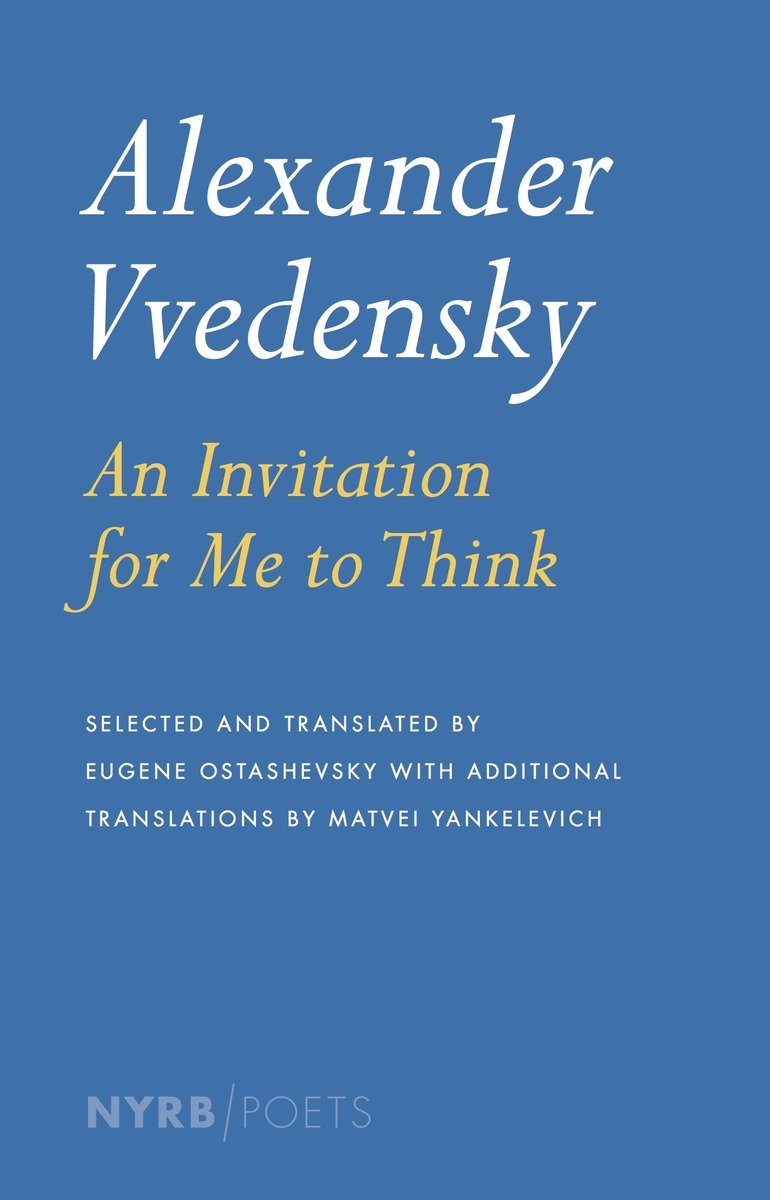Alexander Vvedensky: An Invitation for Me to Think
13.00 JOD
Please allow 2 – 5 weeks for delivery of this item
Description
“Pussy Riot are Vvedensky’s disciples and his heirs. Katya, Masha, and I are in jail but I don’t consider that we’ve been defeated…. According to the official report, Alexander Vvedensky died on December 20, 1941. We don’t know the cause, whether it was dysentery in the train after his arrest or a bullet from a guard. It was somewhere on the railway line between Voronezh and Kazan. His principle of ‘bad rhythm’ is our own. He wrote: ‘It happens that two rhythms will come into your head, a good one and a bad one and I choose the bad one. It will be the right one.’ … It is believed that the OBERIU dissidents are dead, but they live on. They are persecuted but they do not die.” — Pussy Riot [Nadezhda Tolokonnikova’s closing statement at their trial in August 2012]“I raise[d] my hand against concepts,” wrote Alexander Vvedensky, “I enacted a poetic critique of reason.” This weirdly and wonderfully philosophical poet was born in 1904, grew up in the midst of war and revolution, and reached his artistic maturity as Stalin was twisting the meaning of words in grotesque and lethal ways. Vvedensky—with Daniil Kharms the major figure in the short–lived underground avant-garde group OBERIU (a neologism for “the union for real art”)—responded with a poetry that explodes stable meaning into shimmering streams of provocation and invention. A Vvedensky poem is like a crazy party full of theater, film, magic tricks, jugglery, and feasting. Curious characters appear and disappear, euphoria keeps company with despair, outrageous assertions lead to epic shouting matches, and perhaps it all breaks off with one lonely person singing a song.A Vvedensky poem doesn’t make a statement. It is an event. Vvedensky’s poetry was unpublishable during his lifetime—he made a living as a writer for children before dying under arrest in 1942—and he remains the least known of the great twentieth-century Russian poets. This is his first book to appear in English. The translations by Eugene Ostashevsky and Matvei Yankelevich, outstanding poets in their own right, are as astonishingly alert and alive as the originals.
Additional information
| Weight | 0.15 kg |
|---|---|
| Dimensions | 1.17 × 11.43 × 17.78 cm |
| PubliCanadation City/Country | USA |
| by | |
| Format | Paperback |
| Language | |
| Pages | 168 |
| Publisher | |
| Year Published | 2013-4-2 |
| Imprint | |
| ISBN 10 | 1590176308 |
| About The Author | Alexander Vvedensky (1904–1941) was born into the liberal intelligentsia of St. Petersburg and grew up in the midst of war and revolution, reaching artistic maturity just as Stalin consolidated control over Russia. After attending a progressive high school, Vvedensky spent a year working at the State Institute of Artistic Culture (GINKhUK) as a researcher in a lab devoted to Futurist abstract poetry. Along with Daniil Kharms, he then became a major figure in the short-lived underground avant-garde group OBERIU (a neologism for “the union for real art”). Unable to publish his poetry—by the 1930s there was no tolerance in the USSR for work of such shimmering invention and provocation—Vvedensky made a living as a writer of children’s literature. In 1931 he was arrested for his so-called counterrevolutionary literary activities, interrogated, and sentenced to three years of internal exile. He was detained again in 1941, and on February 2 he died of pleurisy on a prison train, leaving behind his wife and four-year-old son. Though much of Vvedensky’s work has been lost, what remains has established him as oneof the most influential Russian poets of the twentieth century.Eugene Ostashevsky is the author of the poetry collections The Life and Opinions of DJ Spinoza and Iterature, both published by Ugly Duckling Presse. He is the editor of OBERIU: An Anthology of Russian Absurdism, the first collection of writings by Vvedensky and friends in English translation. Ostashevsky teaches in the liberal studies program at New York University.Matvei Yankelevich is the author of the poetry collection Alpha Donut (United Artists Books) and a novella in fragments, Boris by the Sea (Octopus Books). His translations of Daniil Kharms were collected in Today I Wrote Nothing: The Selected Writings of Daniil Kharms (Overlook/Ardis). He edits the Eastern European Poets Series at Ugly Duckling Presse. |
"…it's high time that more readers pick up on [Vvedensky's] work to break language, to crush understanding so that what is beneath and beyond it can smuggle its miracle into our event-hemorrhaging lives.” —Asymptote Journal“Unlike the Symbolists, his aim is neither to create an aesthetic paradise nor to suggest or build a bridge to another world—Vvedensky’s is an aesthetics of martyred aesthetics, of not knowing, of the defeat of ‘poetry’ in the service of truth…. His poetic sensibility combines the Russian Symbolist concern for transcendence, God, and ‘other worlds,’ with the Futurist orientation toward syntactical and semantic deformations that draw attention to the artifices of language.” — Thomas Epstein, The New Arcadia Review Praise for OBERiU: An Anthology of Russian Absurdism, edited by Eugene Ostashevsky:"Vvedensky’s poems sear…. Ruminations on faith and loss abound, but there are fewmore churning, lacerating and willfully beautiful works in Eastern literature thanthe prose poem “Frother,” in which three sons hover and cavort around their dyingfather, trying to ascertain the meaning of a mysterious word and a mysterious truth."—The Nation"[OBERIU] mounted a challenge in the late 1920s and 30s to 'worldly logic' by questioning and confusing the most basic categories through which the world may be rendered coherent and transformed into narrative. They did so by writing subversive poems and stories, while 'trusting in neither thoughts nor words' (Alexander Vvedensky). They practised a kind of silence through words, wearing various comic masks while pointing to inexpressible realities." —The Times Literary Supplement"The work of Oberiu is as relevant to our moment as when it was written." —The Believer "It's about time . . . the Oberiu . . . became a household name like the Surrealists, Dadaists and all the rest." —The Brooklyn Rail "Oberiu is as relevant today as ever." —Bookforum"For anyone intersted in Soviet literature, this book fills an enormous gap. It also presents some beautiful, heartbreaking poetry." —PW Annex "Highly recommended. All readers, all levels." —CHOICEPraise for Vvedensky's The Gray Notebook, published by Ugly Duckling Presse: "These poems do what solid poems should. They stand against time." — Peter Moysaenko, bomblogGeneral praise regarding the movement Vvedensky started (OBERIU): "The OBERIU writers are a revelation, an aspect of Russian modernism in the early Soviet period that has been largely invisible to readers in English.” —Robert Hass “OBERIU, sometimes called Russia's last avant-garde, is one of the most intriguing–and little known–movements of the years before World War II. The absurdist poets at its center—Alexander Vvedensky, Daniil Kharms, and Nikolai Zabolotsky—belonged to the first generation of writers to come of age after the October Revolution . . . Less interested in coining neologisms than in destroying the protocols of semantic coherence and linguistic realism, these poets have produced a series of inventive, free-wheeling, and often hilarious poetic texts in a variety of forms and genres.” —Marjorie Perloff"Skirting oblivion, impossibly present, Vvedensky now even exists in English where he rubs shoulders with contemporaries he never knew, echoing the metaphysical side of Laura Riding, the phenomenological bent of Gertrude Stein, and the grammatical play and befuddling repetition of both." —Matvei Yankelvich, Poetry Daily |
|
| Excerpt From Book | The Joyful Man Franz the joyful man Franz maintained protuberancefrom start to finishhe never came down the porch measured stars named flowers believed I am you affixing number to timehumming in rhymehe died and was deceasedlike the shotgun and the cystfrightened, he would see a skirt as he fantasized asleepand would sail at the helmto a melancholy elm where squads of beetles performed about-facesshowed their mustaches to godspronounced themselves to be clocks gods howled out of tuneand tumbled down from the moonthere in luxurious grassan ant was being stampedand the glowworm, unkind kinglit up a large lamp silently the lightnings flashedlanguid animals snorted unhurriedly growled the waves that lay on the sand where? where did all this happenwhere did this location roamI forgot, the sun will saysinking into the unknownall we see is the exit from the schoolbag of Franzof the contemporary of manthe psychologist of the divinethis wizard announcesthe party beginsidle stars crowd inboring people smoke lonely thoughts run aroundeverything is sad and pointlessGod what kind of party is thisit’s the christmas of death or somethinghens step around gulfsthe hall hops with cupidsand the iron steam-enginemeditates upon cow-pattiesFranz awoke from his nightmarewhy are all these things here?the valet stood here like a palmbefore the meadows of eternityshort as a reedthe collar sleeps upon a chaira branch of keroseneoverlooks the twilightanswer me wizardis this a dream? I’m a foolbut where is that wizardwhere is the psychologist of the divinehe counts songs in his sleepgrowing bald as a treehe can’t come herewhere the real world standshe calmly multiplies the shadeshe does not shimmer in the skyTurks give me my carriagethe joyful Franz calledgive me the rocket of Oberthgive me horsepowerI will ride around the worldin this fascinating cabI will orchestrate a raceof the star with the prisoner earthtouch the ceiling with my headI’m a bluebird I’m […]meanwhile out of the acute night out of the abyss of the bad dream appears a crown and the ramified scytheyou’re an irate serpent my childless deathhello Franz will sadly say each of your hairs holdsmore thoughts than a potmore sleep than a powdertake out your saberand slice open my shirtthen slice open my skin glue me to the bed all the same shall learning triumph I’ll announce as I gurgleand create a grandsonmy substitute in the form of a lamphe will stand and glowwrite essays for schooldeath said you are a flowerand fled to the eastFranz remained aloneto contemplate protuberancemeasure stars name flowerscompose I and youlying in absolute silencein the empty heights 1929-1930[Trans. Ostashevsky] Snow Lies snow liesearth flieslights flip in pigments night has comeon a rug of stars it liesis it night or a demon?like an inane leversleeps the insane riverit is not awareof the moon everywhereanimals gnash their caninesin black gold cagesanimals bang their headsanimals are the ospreys of saintsthe world flies around the universein the vicinity of starsdashes deathless like a swallowseeks a home a nestthere’s no nest a holethe universe is alonemaybe rarely in flighttime will pass as poor as nightor a daughter in a bedwill grow sleepy and then deadthen a crowd of relationswill rush in and cry alasin steel houseswill howl loudlyshe’s gone and buriedhopped to paradise big-belliedGod God have pitygood God on the precipicebut God said Go playand she entered paradisethere spun any which way numbers houses and seasthe inessential existsin vain, they perceivedthere God languished behind barswith no eyes no legs no armsso that maiden in tearssees all this in the heavenssees various eaglesappear out of nightand fly inaneand flash insanethis is so depressingthe dead maiden will sayserenely surprisedGod will saywhat’s depressing what’sdepressing, God, lifewhat are you talking aboutwhat O noon do you knowyou press pleasure and Paristo your breast like two pearsyou swell like musicyou’re swell like a statuethen the wood howledin final despairit spies through the taresa meandering ribbonlittle ribbon a cratecurvy Lena of fateMercury was in the airspinning like a topand the bearsunned his coatpeople also walked aroundbearing fish on a platterbearing on their handsten fingers on a ladderwhile all this went onthat maiden restedrose from the dead and forgotyawned and saidyou guys, I had a dreamwhat can it meandreams are worse than macaronithey make crows double overI was not at all dying I was gaping and lying undulating and cryingI was so terrifyinga fit of lethargywas had by me among the effigieslet’s enjoy ourselves reallylet’s gallop to the cinemaand she sped off like an assto satisfy her innermostlights glint in the heavenis it night or a demon January 1930[Trans. Ostashevsky] |
| Series |
Only logged in customers who have purchased this product may leave a review.






Reviews
There are no reviews yet.